Scalp Acne: Medical Treatment, Home Remedies, and Self-Care
Written by Jessica Lal on March 3, 2023
Your scalp, like the rest of your skin, is prone to various skin problems, including acne or scalp folliculitis. Scalp acne generally develops due to clogging of the hair follicles with dirt or oil. These blocked pores can swell up, get infected, and appear as bumps, often causing irritation, itching, and redness.
Due to its location, scalp acne may cause difficulty in combing, brushing, or styling the hair. It may appear underneath the hair or along the hairline and is often itchy. In fact, scalp acne is more bothersome and uncomfortable than any other type of acne.
The good news is several treatments can treat scalp acne. In addition, taking proper care of your scalp skin can prevent acne formation in the first place.
Causes of Scalp Acne
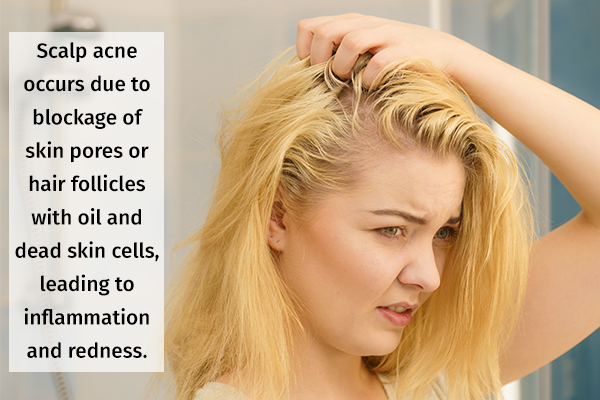
As discussed above, scalp acne occurs due to blockage of skin pores or hair follicles with oil and dead skin cells, leading to inflammation and redness. The condition may also be an extension of facial acne.
Many factors contribute to the formation of scalp acne, including:
- Improper or irregular washing of hair
- Use of tight headgear
- Allergic reaction to chemicals in hair products
- Buildup of hair products on the scalp
- Infection with microbes such as Malassezia yeast, Staphylococcus aureus, and Demodex folliculorum
- Travel and weather changes
- Lack of sleep
- Constant stress, which increases cortisol levels and consequently stimulates overproduction of oil
You may also develop folliculitis, an acne-like condition that occurs due to bacterial infection of the hair follicles. People with curly, frizzy, or long hair are prone to folliculitis and, thus, scalp acne.
Symptoms of Scalp Acne
Scalp acne may manifest in the form of blackheads, pimples, pustules, whiteheads, or nodules on the scalp and back of the head. The acne bumps associated with scalp acne are highly similar to acne that occurs on any other part of your skin.
In-Office Treatment for Scalp Acne
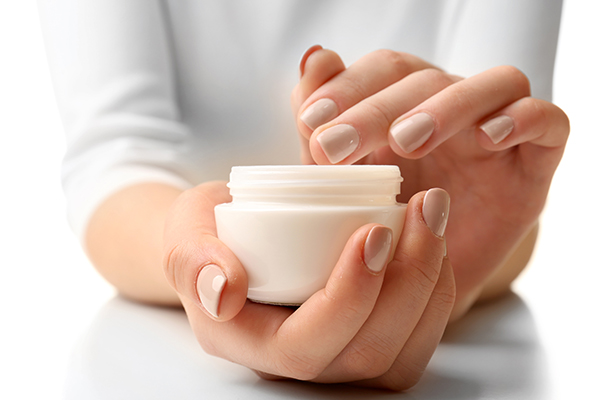
It is best to consult your doctor to determine the cause of your scalp acne and to get suitable treatment. The most common scalp acne treatments used by dermatologists include:
- Salicylic acid. It helps in managing sebum production, thus lowering the chances of developing acne. Moreover, salicylic acid acts against the acne-causing bacteria and helps exfoliate the scalp. It is often employed for the treatment of acne vulgaris.
- Glycolic acid. This chemical provides gentle exfoliation of the scalp without drying it. You can use shampoos containing glycolic acid to cleanse your scalp of bacteria, dead skin cells, and excessive oil.
- Ketoconazole and ciclopirox. These antifungal agents prevent and manage fungal growth on the scalp and thus prevent acne. You can commonly find ketoconazole in many antidandruff shampoos.
- Steroid injections. Steroids are used to control the immune reactions that can damage the hair follicles. They are useful in cases of severe acne that is difficult to control.
- Other medications. The doctor may also prescribe topical or oral antibiotics, antihistamines, steroid creams, phototherapy, and isotretinoin treatments, depending on the cause and condition of your scalp acne.
Home Remedies for Scalp Acne
There are a few readily available natural ingredients that are easy and safe to use in the management of scalp acne. You can use these ingredients in the following home remedies.
1. Apply a coconut oil mask
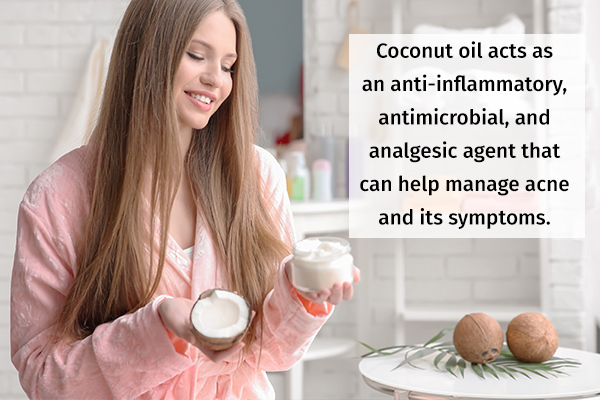
Coconut oil acts as an anti-inflammatory, antimicrobial, and analgesic agent that can help manage acne and its symptoms.
How to use:
- Mix a few drops of tea tree oil in coconut oil.
- Apply the oil blend to your scalp and hair shaft.
- Wash your hair with a mild shampoo after an hour.
- Repeat this remedy two times a week.
2. Use aloe vera gel
Aloe vera gel has healing, anti-inflammatory, and antimicrobial properties that can help manage acne and provide relief from the redness and pain. Moreover, it has cooling and soothing effects on the skin.
How to use:
- Apply fresh aloe vera gel to your scalp.
- Wash your scalp with cold water after 40 minutes.
- Repeat this remedy every day for effective results.
3. Try tea tree oil
Tea tree oil can treat acne due to its antimicrobial and anti-inflammatory properties. Applying tea tree oil to your scalp curbs the growth of acne-causing microbes. Moreover, the use of tea tree oil helps clean the skin pores and manage dandruff.
How to use:
- Buy shampoo containing tea tree oil with a concentration of 5% or less.
- Add 6–7 drops of tea tree essential oil to your conditioner and use it as usual.
- Use tea tree oil-based products on your hair thrice a week for scalp acne management.
4. Do a neem rinse
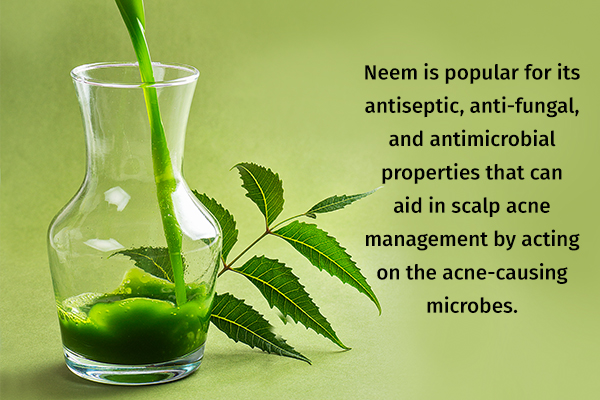
Neem is popular for its antiseptic, antifungal, and antimicrobial properties that can aid in scalp acne management by acting on the acne-causing microbes.
How to use
- Boil 2 cups of water and add some neem leaves to it.
- Allow the mixture to simmer for 10 minutes.
- Let it cool and strain the liquid.
- Use the neem-infused water to rinse your hair after shampooing and conditioning.
- Repeat the remedy up to 3 times a week.
5. Prepare an apple cider vinegar hair rinse
Apple cider vinegar (ACV) has antimicrobial properties that can kill acne-causing bacteria, therefore preventing and reducing scalp acne. Moreover, the use of ACV rebalances skin pH and thus regulates sebum production.
How to use:
- Dilute 2–3 tbsp of ACV in 1 L of water and mix.
- Use the diluted ACV to rinse your scalp after shampooing and conditioning your hair.
- Leave it for a couple of minutes and then give a final water rinse to your hair.
6. Apply tomato juice to the scalp
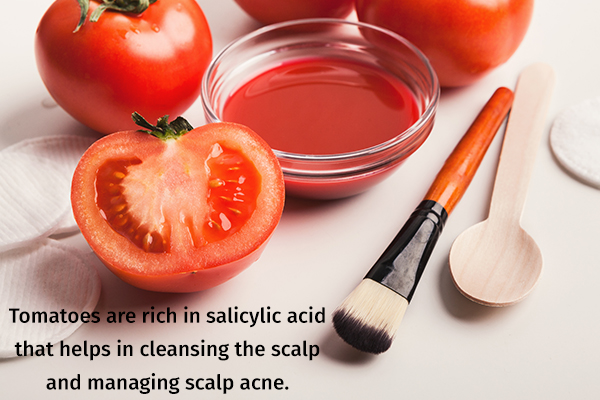
Tomatoes are rich in salicylic acid that helps in cleansing the scalp and managing scalp acne. Moreover, tomato juice helps restore scalp pH, thus assisting in the treatment of scalp dryness or oiliness.
How to use:
- Apply some fresh tomato juice on your scalp. Rinse your hair using warm water after 10 minutes. Repeat this remedy daily for a week or so for effective results.
- Mix 1 tbsp of tomato juice with lemon juice and honey. Using a cotton ball, apply this solution to the affected areas as spot treatment. Rinse your hair after 5 minutes. You can use this remedy daily.
7. Add jojoba oil to your shampoo
Jojoba oil has antibacterial, anti-inflammatory, and noncomedogenic properties, along with a high vitamin C content, which helps control excessive oil on the scalp and unclogs hair follicles. This helps manage scalp redness and prevent scalp acne.
How to use:
Mix a few drops of jojoba oil in your shampoo and use it as usual.
Self-Care Measures and Preventive Tips
Here are some helpful tips to prevent the formation or worsening of scalp acne.
1. Avoid tight headgear
It is best to use loose-fitting headgear, which allows the scalp skin to breathe. If you wear tight headgear such as helmets, make sure to wash your hair afterward to prevent scalp buildup.
2. Refrain from touching acne spots
Do not pick, squeeze, or pop the pimples as it can cause scars and increase the risk of infection. Moreover, avoid combing over the pimple as it can scrape it.
3. Maintain good hygiene
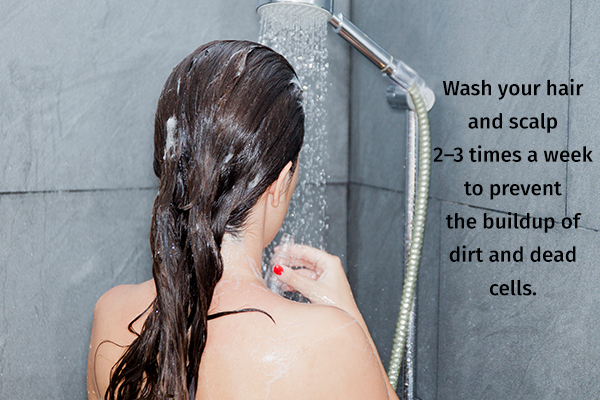
Wash your hair and scalp 2–3 times a week to prevent the buildup of dirt and dead cells. Also, wash your scalp after an intense workout or after you sweat profusely. Make sure to keep your combs and hairbrushes clean as well.
4. Use the right hair care products
You should not use conditioners and shampoos that are heavy and leave a lot of residue. Moreover, avoid products that are laden with chemicals that can irritate your skin. It is best to use sulfate-free and paraben-free shampoos. Make sure to rinse your hair thoroughly to prevent residue buildup.
5. Modify your diet
Your diet also influences your hair health. Sugar, dairy products, refined flour, and fizzy drinks can aggravate scalp acne, so avoid consuming them. Moreover, include vitamins A and D, zinc, omega-3, and other nutrients in your diet to help treat scalp acne.
6. Consume plenty of water
Drink at least 2 L of water every day. You can also consume chamomile and mint tea as they have a soothing effect on the skin.
7. Exercise daily

Regular exercise has a great impact on your overall health, including your scalp and hair health. Therefore, it is suggested to get at least half an hour of exercise thrice a week.
Most-Asked Questions About Scalp Acne
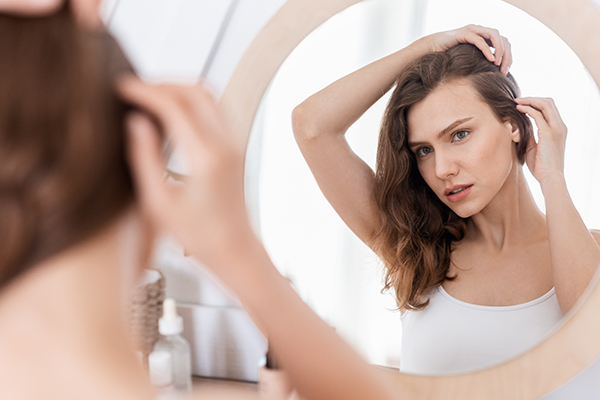
Can scalp acne also result in hair loss?
In the case of severe scalp acne, the inflammation may damage the hair follicles and result in hair loss. This may also lead to bald spots on the scalp if not treated timely.
How long does scalp acne last?
Scalp acne generally heals in about a month. However, it may require a couple more weeks to completely get rid of the pimples. The duration of scalp acne highly depends on the health of your scalp, the treatment you use, and your hair care regimen. However, in most cases, the condition resolves in 3–4 months.
Final Word
Scalp acne, while highly problematic, is not a severe or common condition. It can easily be managed and avoided by maintaining good scalp health.
Taking good care of your scalp is essential to the treatment of scalp acne. This includes washing your scalp properly, especially after working out, avoiding using nails on the scalp to prevent skin damage, and consuming a nourishing diet. It is best to consult a doctor to determine the cause of your scalp acne and to appropriate treatment.







